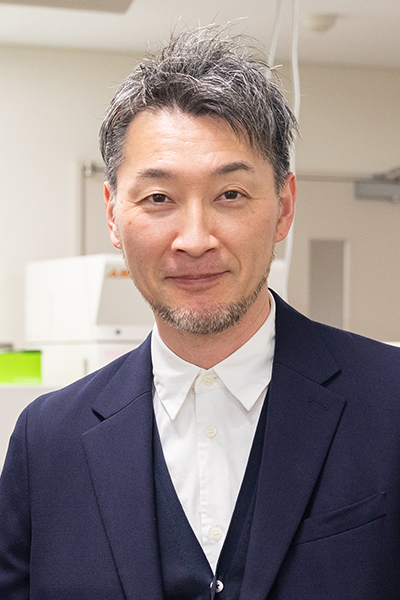
Education
- 2000: Tottori University, School of Medicine
- 2022: Kumamoto University, Graduate School of Medical Science: Immunology & Immunogenetics (M.Sc.)
- 2006: Kumamoto University, Graduate School of Medical Science: Immunology & Immunogenetics (Ph.D.)
Professional Experience
- 2006-2009: Trudeau Institute, Dr. Susan L. Swain’s lab, Postdoctoral Research Fellow
- 2009-2016: Kumamoto University, Department of Immunogenetics, Assistant Professor
- 2017-2021: Kumamoto University, Department of Immunology, Senior Lecturer
- 2021~: Kyoto University, Division of Clinical Immunology and Cancer Immunotherapy, Center for Cancer Immunotherapy and Immunobiology (CCII), Associate Professor
Research Focus
We have conducted in-depth investigations into the mechanistic actions of chronic and excessive inflammatory environments, which contribute to functional impairments in CD4 T cells during antibody response and anti-tumor immune response. Our research has shed light on the detrimental role of the inflammatory cytokine IL-6 in T cell-mediated anti-tumor immune response. Furthermore, we have elucidated the negative influence exerted by macrophages and other host cells on this process throughout tumor progression.
Conversely, the biased activation of CD4 T cells can at times lead to undesired antibody responses directed against self-organ tissues, including cancerous tissues. Therefore, our research in tumor immunology also focuses on the delicate balance between T cell-mediated and B cell-mediated responses. Understanding this mutual balance is of significant interest to our work.
Recently, we have made significant strides in elucidating the cellular and molecular mechanisms that underlie the adverse reactions triggered by cancer immunotherapies, commonly known as immune-related adverse events (irAEs). Through collaboration with clinicians, our efforts are centered around identifying crucial factors that determine both the efficacy and safety of cancer immunotherapy. We place particular focus on investigating the immunological characteristics specific to the elderly population, as they represent the majority of cancer patients.
Additionally, our research delves into understanding the mechanisms behind the induction of inflammatory cytokines, with a specific emphasis on studying elderly individuals. We aim to comprehend the impact of these cytokines on the decline of CD4+ T cell-mediated immune responses, with the ultimate goal of enhancing the efficacy of cancer immunotherapy.
Honors & Awards
- 2013: Young Investigator Award, Japanese Association for Cancer Immunology
- 2016: Research Achievement Award, Kumamoto University
Selected Publications
Yifang Shui, Xin Hu, Hiroshi Hirano, Hirotake Tsukamoto, Wen-Zhi Guo, Kenichiro Hasumi, Fumihiro Ijima, Masayuki Fujino, Xiao-Kang Li, Combined phospholipids adjuvant augments anti-tumor immune responses through activated tumor-associated dendritic cells, Neoplasia, Volume 39, 2023, DOI: https://doi.org/10.1016/j.neo.2023.100893.
Tsukamoto, H., Komohara, Y.,Tomita, Y., Miura, Y., Motoshima, T., Imamura, K., Kimura, T., Ikeda, T., Fujiwara, Y., Yano, H., Kamba, T., Sakagami, T., Oshiumi, H. Aging-associated & CD4 T cell-dependent ectopic CXCL13 activation predisposes to anti-PD-1 therapy-induced adverse events. Proc. Natl. Acad. Sci. U S A. 119, e2205378119 (2022). DOI: 10.1073/pnas.2205378119.
Tsukamoto, H., Kouwaki, T., Oshiumi H. Aging-associated extracellular vesicles contain immune regulatory microRNAs alleviating hyperinflammatory state & immune dysfunction in the elderly.iScience23, 101520 (2020). DOI: 10.1016/j.isci.2020.101520.
Tsukamoto, H., Fujieda, K., Miyashita, A., Fukushima, S., Ikeda, T., Kubo, Y., Senju, S., Ihn, H., Nishimura, Y., Oshiumi H. Combined blockade of IL-6 & PD-1/PD-L1 signaling abrogates mutual regulation of their immunosuppressive effects in the tumor microenvironment. Cancer Res.78, 5011-5022, (2018). DOI: 10.1158/0008-5472.CAN-18-0118.
Tsukamoto, H., Fujieda, K., Hirayama, M., Ikeda, T., Yuno, A., Matsumura, K., Fukuma, D., Araki, K., Mizuta, H., Nakayama, H., Senju, S., Nishimura, Y. Soluble IL-6R expressed by myeloid cells reduces Th1 differentiation & drives tumor progression. Cancer Res.77, 2279-2291 (2017). DOI: 10.1158/0008-5472.CAN-16-2446.
Tsukamoto, H., Senju, S., Matsumura, K., Swain, SL., Nishimura, Y. IL-6-mediated environmental conditioning of defective Th1 differentiation dampens anti-tumor immune responses in old age. Nat. Commun. 6: 6702 (2015). DOI: 10.1038/ncomms7702.
Tsukamoto, H., Nishikata, R., Senju, S., Nishimura, Y. Myeloid-derived suppressor cells attenuate TH1 development through IL-6 production to promote tumor progression. Cancer. Immunol. Res. 1: 64-76, (2013). DOI: 10.1158/2326-6066.CIR-13-0030.
Tsukamoto, H., Huston, G.E., Dibble, J., Duso, D.K., Swain, S.L. Bim limits the accumulation of naïve CD4 T cells with age-related defects by regulating their lifespan. J. Immunol. 185: 4535-4544 (2010). DOI: 10.4049/jimmunol.1001668.
Tsukamoto, H., Clise-Dwyer, K., Huston, G.E., Duso, D.K., Buck A.L., Haynes, L., Swain, S.L. Age-associated increase in lifespan of naïve CD4 T cells contributes to T cell homeostasis but facilitates development of functional defects. Proc. Natl. Acad. Sci. U S A. 106: 18333-18338 (2009). DOI: 10.1073/pnas.0910139106.
